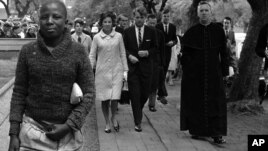07 June, 2016
In June 1966, U.S. Senator Robert F. Kennedy visited South Africa and made what some historians believe was his best speech ever.
"Each time a man stands up for an ideal‚ or acts to improve the lot of others‚ or strikes out against injustice‚ he sends forth a tiny ripple of hope‚ and crossing each other from a million different centers of energy and daring, those ripples build a current which can sweep down the mightiest walls of oppression and resistance."
Fifty years later, his words are still remembered.
Recently, members of the Kennedy family traveled to South Africa to mark the anniversary of the speech.

In this June 5, 1966, file photo Sen. Robert F. Kennedy, back right, and his wife, Ethel, back left, arrive at the Roman Catholic Cathedral in Pretoria, South Africa, during a visit to the country. In 1966 Kennedy traveled to apartheid South Africa and spoke about equality and the rule of law. This week members of his family are in democratic South Africa to mark the 50th anniversary of that visit. (AP Photo)
In 1966, the country was living under apartheid, a social system in which whites had more political and economic rights than other races. At the time, it seemed as if South Africa's racial separation policies would never end.
Robert Kennedy's four-day visit raised hopes that apartheid might end someday.
Kennedy went to South Africa less than three years after the murder of his brother John F. Kennedy, the 35th president. In 1968, the senator hoped to become president. But he was shot and killed by a gunman after winning the Democratic Party's presidential primary in California.
Kerry Kennedy is a human rights activist and Robert Kennedy's daughter. She says that while race relations have improved in both the U.S. and in South Africa, changes took place because the two countries were forced to make them.
"All those changes took place not because governments wanted them to -- governments tried to stop them. And not because militaries wanted them to -- militaries tried to stop them. And not because huge multinational corporations wanted them to -- multinational corporations tried to stop them -- including South Africa.
"All those changes took place because small groups of determined people harnessed the dream of freedom and made it come true. That's what creates change."
Kennedy spoke to a gathering at the University of the Witwatersrand in Johannesburg. Many in the crowd were young South Africans who have expressed anger about corruption and their political leaders. Millions of South Africans say they have yet to experience the economic equality they were promised when apartheid ended 20 years ago.
Kerry Kennedy said that, when times are dark, one thing always shines through: hope.
I'm Christopher Jones-Cruise.
VOA Correspondent Anita Powell reported this story from Johannesburg. Christopher Jones-Cruise adapted it for Learning English. George Grow was the editor.
We want to hear from you. Visit 51VOA.COM and post your thoughts about Robert Kennedy. Or write to us in the Comments section, thanks!
________________________________________________________________
Words in This Story
ripple – n. something that passes or spreads through or over someone or something -- usually singular (often + of)
sweep down – v. to destroy or remove (something) completely
multinational corporations -- n. a company or business with offices around the world
harness – v. to use (something) for a particular purpose